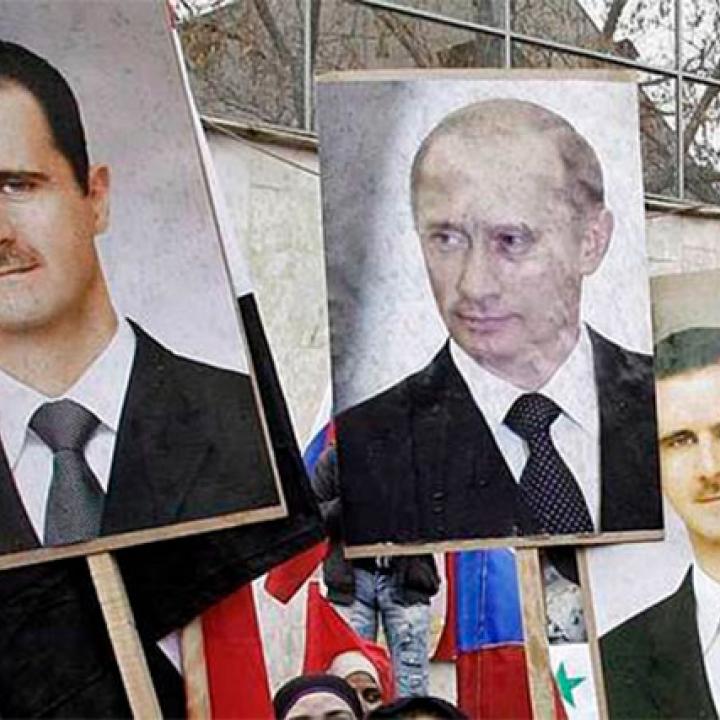

August 25, 2017
In the prolonged search for a solution, the Syrian conflict has influenced Russian-Turkish relations greatly, causing either tension or rapprochement depending on each country’s often conflicting interests. But the major change occurred after Turkey’s failed coup and Russia’s supportive position towards the Turkish regime afterwards. As a consequence, the countries’ relationship began to improve.
To focus on the developments of the Syrian issue in the course of Russian-Turkish relations, it is essential to understand the conflict’s importance to both countries and their key points of agreement and disagreement.
The importance of the war to Russia stems from their political, economic, and military interests in Syria. Other than Iran, which has its own interests in the region, Syria is Russia’s only foothold in the Middle East through which they can influence developments in the Arab world and the Mediterranean, due in part to their military bases in Syria. It is also the primary Arab country for Russian trade and economic cooperation and a major importer of Russian weapons. Russia can leverage its influence in Syria as a bargaining chip in international affairs, such as gaining a passive acceptance of the Ukrainian crisis or alleviating international economic sanctions against Russia.
Turkey’s interest in the Syrian crisis is based on the extended border between the two countries. Syria’s instability was sure to impact Turkey’s domestic political dynamics, with the increased danger of the Islamic State and the appearance of armed Syrian Kurdish groups that took control of large tracts of. Turkey is also a major host of Syrian refugees and all the economic and security ramifications that come with such an influx of people; Syria is also an important economic corridor for Turkey into the Arab region. In addition, Turkey has a regional policy which aims to extend its influence throughout the region by utilizing political, economic, and cultural tools.
The Syrian crisis involves many points of disagreement between Turkey and Russia, some of which have recently caused tension in their bilateral relations despite other improvements. Key points of disagreement include Syrian leadership, opposition and Kurdish groups, and the American role in the conflict.
Russia has provided absolute political, military, and economic support to Syrian president Bashar al-Assad. By contrast, Turkey calls for Assad’s removal and demands a democratic regime and support to the political and military Syrian opposition groups. Until recently, Russia considered all anti-Assad armed groups to be terrorist organizations and targeted various of these groups; now, with the exception of the Islamic State and Jabhat Fatah al-Sham, Russia recognizes and negotiates with armed factions, including the People’s Protection Units (YPG). Turkey, meanwhile, considers the Islamic State, Jabhat Fatah al-Sham, the YPG, and the militias fighting with Assad to be terrorist organizations.
Russia supports the Kurdish Democratic Union Party in Syria (PYD) – that opened a political office in February 2016 in Moscow – and backed it militarily, using the party as a pressure tool against Turkey during periods of tension and as a negotiation tool upon resuming relations. However, Turkey views the PYD as a security threat that cannot be ignored. As Turkey sees it, an independent Kurdish region in Syria would mean that Turkey’s Kurds would also demand federalism or independence.
Russia condemned the American missile attack in April as a stringent violation of international law and Syrian sovereignty. Turkey, however, welcomed the attack and called it a positive response to the crimes committed by the Syrian regime against civilians. This disagreement has only expanded the gulf between Syria and Turkey, as it very publicly undermined Russia’s position towards Syria.
Despite these serious disagreements, however, there are still a number of points at which Russia and Turkey converge, driven by recognition of their mutual roles in finding a solution to the Syrian crisis that preserves their interests. Just as Russia seeks to gain Turkey’s allegiance in the Middle East since it understands the extent of Turkey’s influence on armed groups in Syria, Turkey showed a similar inclination to settle disagreements with Russia. Shared interests and goals between the two countries include combating terrorism, preserving Syria’s territorial integrity, and ultimately bringing the war to an end.
Russian-Turkish coordination against the Islamic State and Jabhat Fatah al-Sham - despite Russia’s lackluster interest in doing so - started with air strikes targeting Islamic State positions in Syria, while Turkey backs the Free Syrian Army in Operation Euphrates Shield against the Islamic State and the YPG.
Both Russia and Turkey agree on the need to preserve Syria’s borders and prevent Kurdish autonomy in Syria. They even agree on the issue of supporting certain Kurdish armed groups in Syria, to a certain and limited. Russia showed less interest in going after those groups after its relations with Turkey resumed and improved.
Russia and Turkey each seek paths in the war that fit their own interests. On the one hand, Russia has become the most influential actor on the Syrian scene and it seeks to secure its political interests and presence in the region as well as its continued role in the Syrian issue and its ability to use this role in regional affairs. On the other hand, Turkey aims for a solution that brings democracy to Syria – albeit one with strong Turkish connections – and prevents Kurdish federalism, guarantees the return of Syrian refugees, and eradicates terrorism.
The motives of the Russian-Turkish rapprochement are not enough to ensure continued positive relations, especially as the United States’ new role under the Trump administration has yet to be determined. Russian and Turkish points of agreement regarding the Syrian issue were not the only reason for their improved relationship; their mutual economic needs and political considerations played a major role. Nonetheless, the Syrian war has and will remain a powerful variable.


